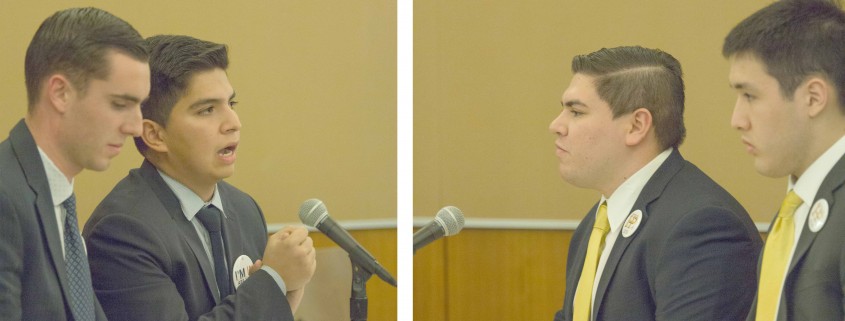USG candidates debate their policies toward diversity
The Undergraduate Student Government presidential and vice presidential candidates debated issues of diversity Thursday night. The two tickets, the first comprised of Program Board Finance Director Edwin Saucedo and USG Director of University Affairs Austin Dunn and the second of Senatorial Aide Charlie Henriquez and Resident Student Government Vice President of Programming Cole Pham debated on the challenges that minority groups face on campus.
The candidates tackled issues of racism, sexism, equality and the promotion of an inclusive campus where students of all backgrounds can feel welcome and safe. The hour-long debate, moderated by USG Director of Diversity Affairs Moira Turner, provided a platform for the candidates to address diversity concerns that many students consider among their chief concerns at USC.
Turner opened the debate by asking the candidates what they believed diversity entailed. All four candidates expressed similar views; diversity entails the different ways an individual expresses him or herself and the necessity of having safe spaces for people of all backgrounds and creeds to feel safe.
“While we often hear statistics about USC being one of the most diverse college campuses in the nation, the statistics are irrelevant if students themselves don’t feel welcome or represented,” Dunn said. “We’re trying to reach as much of our student population as possible.”
Questions were submitted from various minority groups on campus such as the Asian Pacific American Student Assembly, who asked candidates about what they believed to be the most pressing issues faced by Asian Americans on campus. Saucedo, who was the first Latino intern at the Center for Asian Americans United for Self Empowerment, stated that a major issue for the community was the problem of being the “model minority.”
“Many people lump Asian Americans together and regard them as the model minority,” Saucedo said. “People frequently make assumptions and falsely group all Asians together.”
Henriquez similarly stated that the stereotypical views people often glaze over all Asian Americans is a major problem which must be addressed at USC.
“A lot of Asian Americans don’t speak their ancestors’ languages, and a lot of times, people see these individuals as coming from a collective center,” Henriquez said. “We want to go out and start these programs and initiatives to celebrate different cultures, as a lot of festivities go on in the Asian culture.”
The Latina/o Student Assembly questioned the candidates on their opinion of issues of the Latino community, raising concerns over previous candidates presenting false promises with little accountability. Pham said that a mobile application to use as a resource would be beneficial in this area.
“A mobile application would be a resource for not only the Latino community, but for anyone who is looking for resources in general,” Pham said. “It would be a one-click place, and they wouldn’t have to go out and search for resources; they would just be in the palm of their hand.”
Another issue raised during the debate by Women’s Student Assembly was that of sexual assault and gender harm. All four candidates had very strong opinions on the matter, promising to strengthen USC’s policies regarding sexual violence.
“We must change our sexual assault response time, making sure the timeline is between four to six weeks, rather than six to nine months, which it currently is,” Saucedo said.
The International Students Assembly questioned each candidate on their goals for serving the international student population and how they will go about actualizing them. Saucedo said that the resources international students have available need to help them acclimate to life in the United States better.
“The international student resources on campus are complete crap,” Saucedo said. “Yes, we now have an actual resource center on campus, but that doesn’t mean it serves students beyond doing visas and paperwork, so we must expand our resources and help students adapt to a different culture.”
A question proposed by the Black Student Assembly asked the candidates what kinds of experiences they had working with others from different backgrounds than their own. Henriquez said that he has worked with a diverse student body through his on-campus involvement.
“Joining different organizations have given me the experiences of working with people of different backgrounds, and I’ve learned to never assume and not judge but to let things flow naturally,” Henriquez said.

